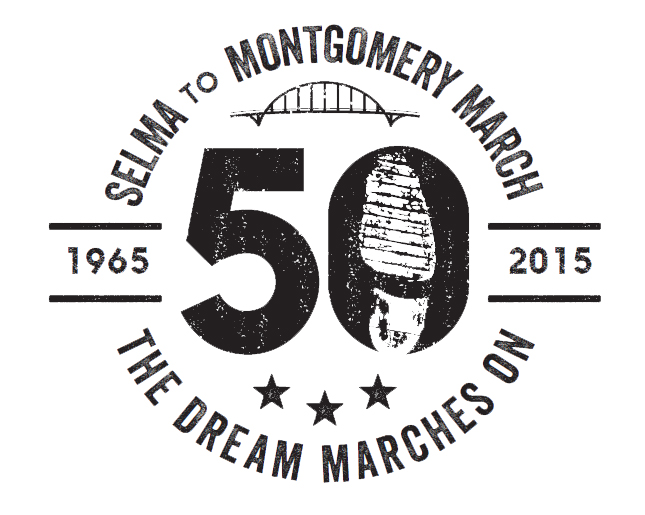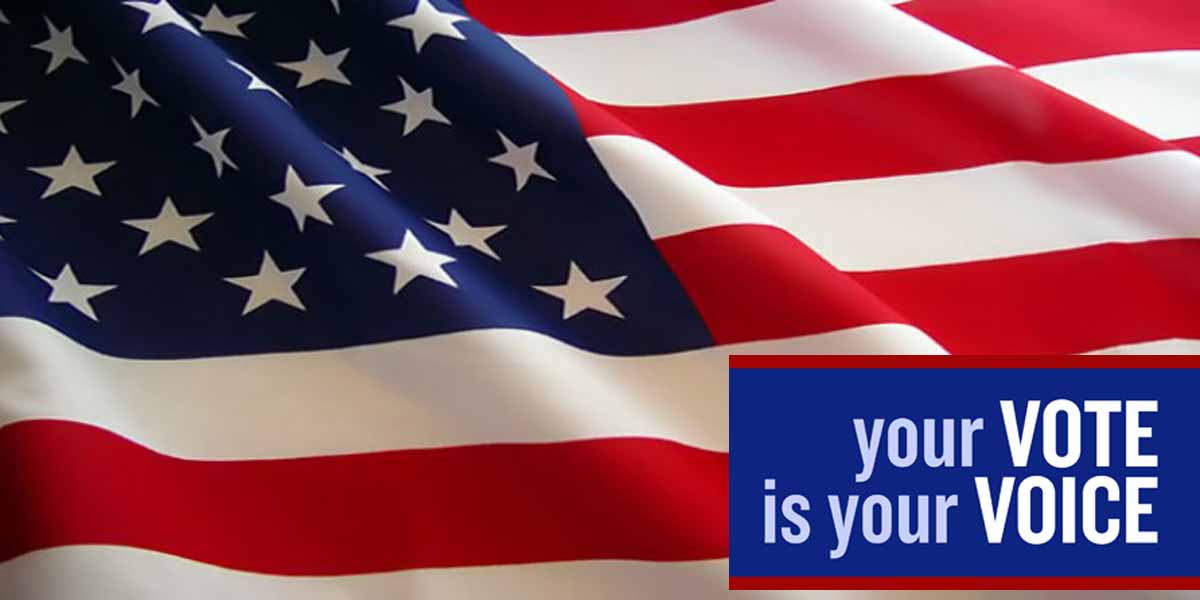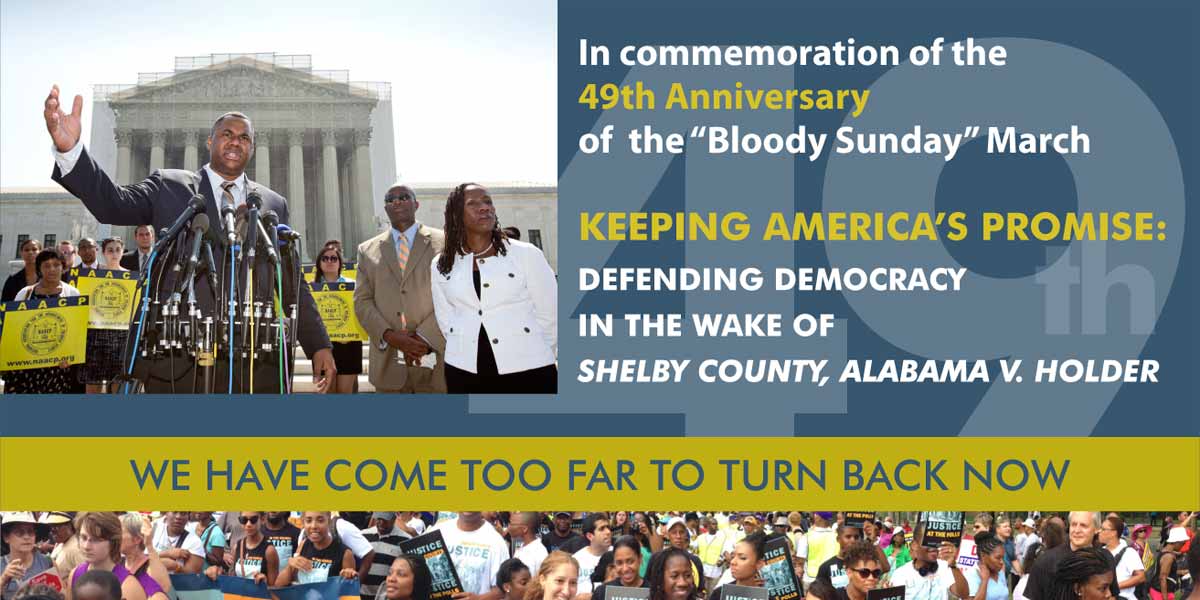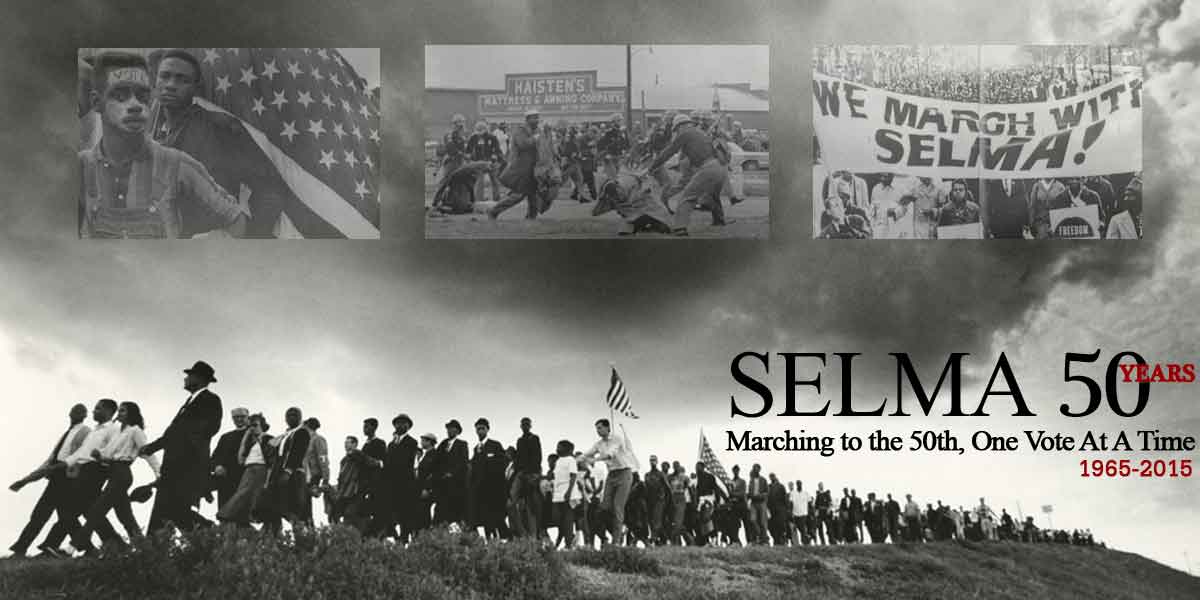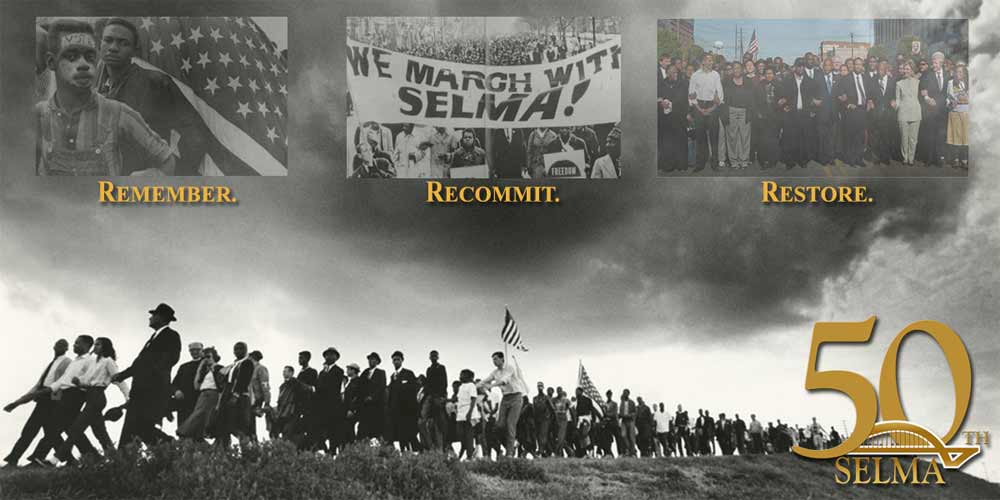(Compiled from media reports) — Attorney Ryan Haygood, Director of the NAACP Legal Defense Fund Political Participation Group, will hold a workshop during the Selma Jubilee weekend on the latest developments in the efforts to restore key provisions of the 1965 Voting Rights Act. “Keeping America’s Promise: Defending Democracy in the Wake of Shelby County, Alabama v. Holder” is a critical discussion about the future of our most important voting protections. The workshop is set for Saturday, March 8, 2014, from 2:00 pm to 4:00 pm at the St. James Hotel, 1200 Water Avenue, Selma, Alabama, 36701.On January 16, 2014, fewer than seven months after the U.S. Supreme Court’s shameful ruling in Shelby County, Alabama v. Holder—striking a key Voting Rights Act provision—Members of Congress introduced bipartisan legislation to restore the promise and protections provided by the Voting Rights Act.
The legislation, known as the Voting Rights Amendment Act of 2014 (VRAA), reflects Congress’s recognition of the urgent need to protect the millions of voters of color made vulnerable to voting discrimination by the Shelby County decision. It also reflects the continuous vigilance of our partners like you, who urged Congress to act swiftly and aggressively in this pivotal moment in our democracy’s history.
The VRAA, however, is not perfect. Indeed, it is just a first step. We must act now to urge Congress to strengthen this bill to ensure that voters of color have full, equal, and active access to the ballot box.
“There is much more work for Congress, civil rights groups, and communities to do,” Sherrilyn Ifill, President and Director-Counsel of the NAACP Legal Defense & Educational Fund, Inc. (LDF) said in a recent press release. “Our common aim is to ensure that all Americans can participate equally in the political process. “The bill provides an excellent starting point for public engagement in this process. It’s imperative that we all work together to ensure that no one is denied the right to vote, particularly on account of their race or language minority status. We applaud the courageous, bipartisan effort to press through a voting rights bill, despite the many other urgent matters facing our Congress.”
The NAACP LDF is committed to ensuring that the final legislation protects all Americans’ right to vote. “We will work with Congress, community groups, and our colleagues in the civil rights community over the next weeks and months to strengthen this bill to ensure that it protects all voters against discrimination,” said Leslie Proll, Director of LDF’s Washington office.
The NAACP (LDF) represented Black community leaders from Shelby County, Alabama and argued the case in the Supreme Court. We fought to keep this critical pre-clearance protection in place, and presented irrefutable evidence that racial discrimination persists in the places covered by Section 4(b), and subject to Section 5’s pre-clearance scrutiny.
In Shelby County, Alabama v. Holder, the Supreme Court struck down as unconstitutional Section 4(b) of the Voting Rights Act. This key provision identified 15 states and localities that were subject to Section 5 of the Voting Rights Act because of their longstanding and ongoing patterns of racial discrimination in voting. Section 5 required those 15 places to demonstrate to the U.S. Department of Justice or a federal court in Washington, D.C. that proposed changes to their voting laws would not be harmful to voters of color before those laws could be implemented. By striking down Section 4(b), the Supreme Court immobilized Section 5.
Within hours of the Supreme Court’s Shelby County decision, the State of Texas, where in 2012 alone Section 5 of the Voting Rights Act blocked the state’s discriminatory photo ID law and intentionally discriminatory redistricting plans, announced its intention to implement those measures immediately. This is only one of many examples of formerly-covered states declaring their intent to take advantage of the gap in Section 5 protection by reverting back to laws that the Voting Rights Act had previously blocked.
Known as the crown jewel of civil rights laws, Section 5 of the Voting Rights Act has served as our nation’s discrimination checkpoint, providing critical protection for millions of voters of color—Black, Latino, Asian American, American Indian, and Alaskan Native—in those places of our country where racial discrimination has been the most persistent and adaptive.
In its shameful opinion, however, a narrow majority of the Supreme Court made these millions of voters vulnerable to voting discrimination. The Supreme Court did this even though a bipartisan Congress in 2006 voted nearly unanimously to reauthorize Section 5 of the Voting Rights Act. After hearing from more than 90 witnesses with a diverse range of views, holding 20 hearings, and evaluating a 15,000 page record, 98 Senators and 390 House members voted to re-authorize Sections 4(b) and 5 of the Voting Rights Act. The Court’s Shelby County decision disregards the will of Congress, and, more importantly, the will of the voters represented by Congress.
Notwithstanding the Supreme Court’s ruling in Shelby County, the fight continues. Our parents and forebears fought harder and against immeasurably greater obstacles. With Thurgood Marshall at the helm, LDF first began to challenge racial discrimination in voting in the 1940s. Our charge today is attainable. Our legal team here at LDF will continue to aggressively use all available legal tools, including the remaining provisions of the Voting Rights Act, to challenge harmful discriminatory measures which, in the wake of the Supreme Court’s decision, are newly arising throughout places formerly covered by Section 4(b).
As we have for more than 70 years, LDF pledges to vigorously pursue our mission to protect the rights of voters of color to participate fully in the political process.
[highlight ]HOW TO TAKE ACTION[/highlight]
The NAACP LDF Needs You to Help in Two Critical Ways:
1. Without the key provision of the Voting Rights Act that required certain states to report all voting changes before their implementation, you now become our eyes and ears on the ground.
We encourage you to let us know of any voting changes that are planned in your area, which you believe may have a negative impact on your community. These changes might include: moving polling places to locations that are difficult for your community to access; switching to at-large voting or appointing officials who were formerly elected; redrawing district lines in a manner that reduces the number of majority-Black or Latino (or other majority-minority) districts; reducing the early voting period; curtailing opportunities to register to vote; or implementing new voter ID requirements.
We need you to collect stories about such voting changes in your community, and to tell us about them at vote@naacpldf.org. You also can call the Election Protection hotline, maintained by LDF and a coalition of civil rights groups, at 1-866-OUR-VOTE.
2. Congress is uniquely empowered to respond to the Supreme Court’s ruling, and we must harness our collective energy to ensure that Congress acts.
Now is the time for you to reach out to your Senators and Representatives in the U.S. Congress, and urge them to make it a top priority to respond to the Supreme Court’s Shelby County ruling by protecting our voting rights.
The Voting Rights Act has been reauthorized four times—always with bipartisan support, and even in times of great national division. We have done this before. Now, we can and must do it again.
For more information, contact: Ryan Haygood, Director, LDF Political Participation Group, at 212.965.2235. Email: rhaygood@naacpldf.org. Website: www.naacpldf.org


